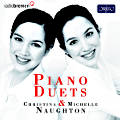ORFEO International – Reviews
Important Releases Briefly Introduced
October 2012
ORFEO 1 CD C 859 121 A
Piano Duets - Christina & Michelle Naughton
Since their début as a piano duo in 2008, the twins Christina and Michelle Naughton have proved little short of sensational in concert halls all round the world. They both studied at the prestigious Curtis Institute of Music in Philadelphia as well as with a number of distinguished teachers, including Claude Frank, Gary Graffman and Seymour Lipkin, granting them an insight into the most disparate musical styles that goes far beyond a mere sovereign command of their instrument. 
Christina & Michelle Naughton
Foto: CAMIThis stylistic and technical mastery is abundantly clear from their début album on the Orfeo label, in which the Naughton sisters demonstrate supreme flexibility in affording listeners a varied glimpse of the repertory for piano four hands and two pianos. 
C 859 121 ATheir programme spans almost two centuries in the history of music, extending, as it does, from Mozart’s D major Sonata K 448 to Lutoslawski’s Variations on a Theme by Paganini – a theme taken up and explored by many other composers. The Naughton sisters invest this work with a joviality that effortlessly communicates itself to the listener. Indeed, the 20th- and 21st-century repertory in general is one of their central, self-evident concerns. Brahms’s Haydn Variations is another well-known work that belongs to the same genre, its climaxes demanding a tonal splendour that seems positively orchestral in character and that the Naughton sisters can produce when necessary. By contrast, their performances of Mendelssohn’s Allegro brillant and Schubert’s A minor Allegro (“Lebensstürme”) are distinguished by cantabile playing of simple beauty and by scales and chords which dynamically and agogically are subtly attuned to each other’s instrumentalism. Two 20th-century classics prove infectiously exciting with their vivid dotted rhythms: the First Spanish Dance from Falla’s La vida breve and Ravel’s La valse in the version for two pianos prepared by the composer himself. Listeners who enjoy this recording, which was made in the broadcasting studio of Radio Bremen, can look forward to Christina and Michelle Naughton’s forthcoming recitals at the start of the 2012/13 season, including appearances at the Herkulessaal in Munich and the Philharmonie in Berlin.
top |